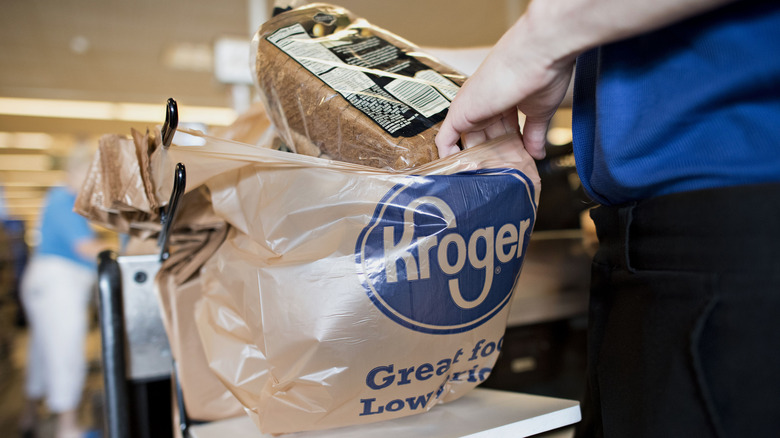Why There Will Probably Never Be A Kroger In New Jersey
New Jersey has a lot of tasty things to eat and drink. If you're looking to cook at home and are searching specifically for Kroger groceries, the Garden State does not have you covered; there are no Kroger stores in New Jersey.
Kroger originated just two states west, in Ohio circa 1883, per Encyclopedia Britannica. Bernard "Barney" H. Kroger and B.A. Branagan founded what was then known as the Great Western Tea Company (Barney was a tea salesman), which became a chain almost immediately. Branagan left shortly into the beginning of the company's run, but Barney continued to expand it, both in terms of locations and offerings. Right before the business reached its zenith in store numbers, Barney retired, and the chain consolidated its many locations into supermarkets over the following decades. Nowadays, Kroger is one of the largest retailers in the world.
Kroger attributes its success to a handful of innovations. Since the beginning, Kroger has strived to be a one-stop shop and offer delivery to its customers. The business has also long sold private brands. In the 1930s, Kroger became the first grocery chain to test food scientifically and regularly monitor its groceries' quality. Later, in 1972, the company became the first American grocery retailer to try out electronic scanners, according to the company's website. Through these strategies, Kroger grew to make hundreds of billions of dollars annually and spread across 35 states, merging with various companies. So, why hasn't it penetrated the New Jersey market yet?
Steep competition
The Garden's State retail scene is already crowded with resilient grocers. As noted by North Jersey of USA Today, the food cooperative known as Wakefern has a powerful presence in the Northeast. So, to step into the ring with any chance of success, Kroger would need to merge with or acquire another company with an established foothold in the area.
What makes Wakefern so intimidating? To answer that, one must look at the era following World War II, when this collection of individual supermarket owners first joined forces. During the war, consumers often patronized independent grocers, especially in the face of government price-controlling and food rationing. When all that ended, self-service megastores offered more options that cost less, so customers shifted loyalties. To stabilize their businesses, a handful of independents banded together to buy goods for cheap and thus collectively stay afloat. The idea worked, and since then, Wakefern has grown to become the United States' biggest retail-owned cooperative, still championing small businesses like Shoprite year after year. Kroger, far from being a small business, is a natural rival.
This dynamic persists. Supermarket News reports Wakefern prospered in 2020 as people had to abandon the foodservice industry for retail during quarantines. 2022 has also been a blockbuster year for Wakefern. Its latest focus is on discounts, e-commerce, and private labels, all healthy trends in the modern day. How can Kroger possibly compete?
Advancing into New Jersey
Kroger has a pattern of absorbing companies to spread its influence. As noted by North Jersey, the business expanded into Northeast states like Delaware and Maryland fairly recently by acquiring the Harris Teeter chain. However, in 2014, when Montvale, New Jersey-based A&P was nearing bankruptcy and seeking another entity to purchase it, Kroger declined. The company prefers to acquire thriving businesses. So, is that it, then? Kroger will never exist in New Jersey?
Recent news may change things. In October of 2022, Kroger announced plans to acquire Albertsons and its Acme Markets and Kings Food Markets chains, which already have locations in New Jersey (via NJBiz). This move will allow both to lower administrative costs, make operations more efficient, and pool resources for technological advances, supposedly providing shoppers with better value. The two could merge by 2024, but organizations like the Federal Trade Commission do have a say in the matter.
In late November 2022, CNBC documented politicians grilling both CEOs involved at a congressional hearing, despite their insistences the move won't hurt competition. Democrats and Republicans alike don't seem to be buying it. Neither is the United Food and Commercial Workers grocery union. Food inflation continues to persist, and letting competitors join forces may make that worse. In the shuffle, laborers could also lose pay, pension plans, or employment altogether. Smaller grocers may also face unfair pressure. Considering all this, it seems unlikely Kroger will sneak into New Jersey through this merger.


